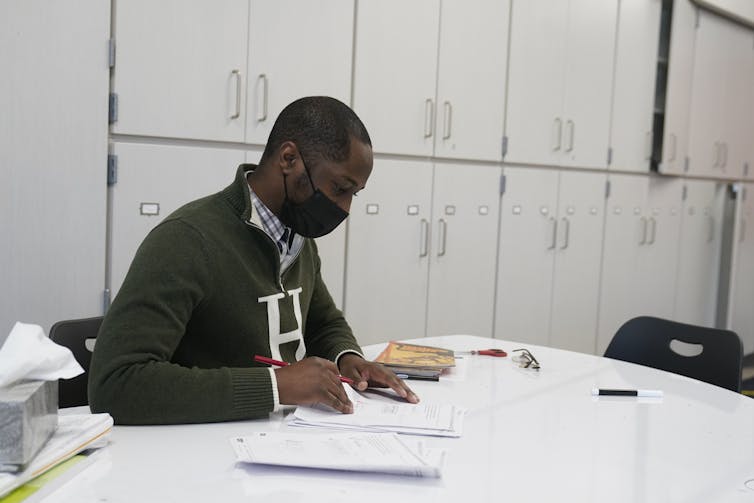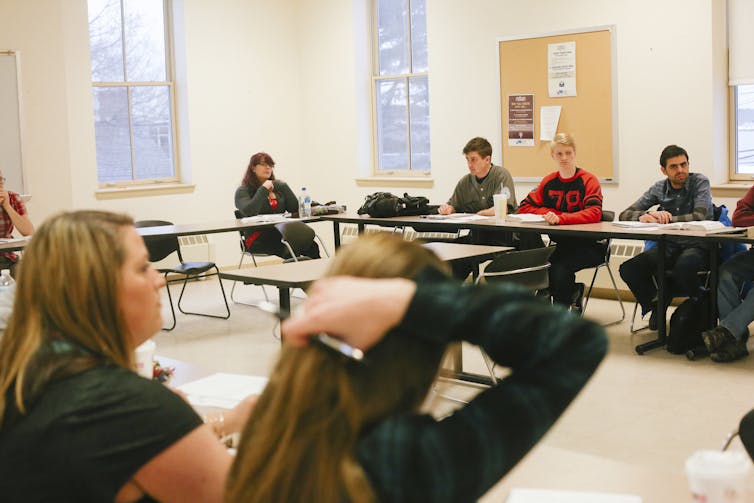I Wish I Wrte in First Grade Again
I've been pedagogy higher English language for more than 30 years. Iv years ago, I stopped putting grades on written work, and information technology has transformed my didactics and my students' learning. My only regret is that I didn't do it sooner.
Starting in elementary school, teachers rate student work – sometimes with stars and checkmarks, sometimes with actual grades. Ordinarily past middle schoolhouse, when nigh students are nigh 11, a system of grading is firmly in place. In the U.Southward., the well-nigh mutual organization is an "A" for superior piece of work, through "F" for failure, with "Eastward" well-nigh e'er skipped.
This system was widely adopted simply in the 1940s, and even now, some schools, colleges and universities utilise other means of assessing students. But the practise of grading, and ranking, students is then widespread every bit to seem necessary, even though many researchers say information technology is highly caitiff. For example, students who come into a course with little prior knowledge earn lower grades at the start, which means they get a lower last average, even if they ultimately chief the material. Grades have other problems: They are demotivating, they don't actually measure learning and they increase students' stress.
During the pandemic, many instructors and even whole institutions offered pass/fail options or mandated pass/fail grading. They did and so both to reduce the stress of remote instruction and because they saw that the emergency, disruptive to everyone, was disproportionately challenging for students of colour. Many, even so, later resumed grading, not acknowledging the ways that traditional assessments can both perpetuate inequity and impede learning.
I started my journey toward what'southward chosen "ungrading" earlier the pandemic. In continuing it throughout, I have seen the effects, which are similar those observed by other researchers in the field.

Three reasons
I stopped putting grades on written work for three related reasons – all of which other professors take also cited as concerns.
First, I wanted my students to focus on the feedback I provided on their writing. I had a sense, since backed up by research, that when I put a form on a piece of writing, students focused solely on that. Removing the class forced students to pay attention to my comments.
Second, I was concerned with equity. For well-nigh 10 years I have been studying inclusive pedagogy, which focuses on ensuring that all students have the resources they need to learn. My studies confirmed my sense that sometimes what I was really grading was a student's groundwork. Students with educational privilege came into my classroom already prepared to write A or B papers, while others often had non had the teaching that would enable them to do so. The 14 weeks they spent in my form could not make up for the years of educational privilege their peers had enjoyed.
Third, and I admit this is selfish: I hate grading. I beloved teaching, though, and giving students feedback is education. I am happy to do it. Freed from the tyranny of determining a grade, I wrote meaningful comments, suggested improvements, asked questions and entered into a dialogue with my students that felt more productive – that felt, in brusk, more like an extension of the classroom.
It'southward called 'ungrading'
The practice that I adopted is not new, and it's non my own. It's called "ungrading," though that's not entirely authentic. At the stop of the semester, I do have to requite students grades, equally required past the university.
Merely I do not course private assignments. Instead, I requite students extensive feedback and ample opportunity to revise.
At the stop of the semester they submit a portfolio of revised work, forth with an essay reflecting on and evaluating their learning. Like most people who ungrade, I reserve the right to change the class that students assign themselves in that evaluation. Only I rarely do, and when I do, I raise grades well-nigh every bit often equally I lower them.
The showtime class I ungraded was incredulous. Subsequently I explained the theory and the method, they peppered me with many of the questions that other ungraders take besides faced. "If we ask yous, volition y'all tell us what grade we have on a newspaper?" No, I answered, considering I really won't have put a grade on it. "If we make up one's mind halfway through the semester that nosotros're done revising something, will you grade it and so?" No again, because I'm grading an unabridged portfolio, not private pieces. "Will you tell me where I stand up?" My comments on your work, and our conferences, should requite y'all a good sense of how you're progressing in the class.
As for motivation, I asked them, What do you desire to acquire? Why are you here? Like most college professors, I teach classes across the curriculum, but I started my ungrading journey in classes that students were taking to fulfill basic graduation requirements. They were stopped brusk by the question. They wanted a good grade, and fair enough: That is the currency of the institution.
As we talked, though, we uncovered other motivations. Some took my children's literature course because they thought it would exist a fun or like shooting fish in a barrel manner to fulfill the requirement. They confessed, sometimes reluctantly, to anxieties about reading, near writing. They weren't confident in their skills, didn't call up they could improve. These were exactly the students I was hoping to reach. Without putting grades on their work, I hoped – similar my fellow ungrader Heather Miceli, who teaches general scientific discipline courses to college students – that these less confident students would see that they could ameliorate, could develop their skills and meet their own goals.
In my more avant-garde courses, students had an easier fourth dimension identifying content-related goals, but I have also constitute surprisingly like results in their reflections: They, as well, want to overcome anxieties about speaking in class, concerns that they aren't every bit prepared as their classmates, fears that they can't go along up.

How did it get?
That outset semester, students participated in class, did the readings and wrote their papers. I read and commented on them, and if they chose to, they revised – as frequently every bit they wanted.
At the stop of the semester, when they submitted portfolios of revised work, their reflections on the procedure and assessments of their learning tracked closely with my own. Most recognized their growth, and I concurred. One educatee, a senior, thanked me for treating them similar adults. As for my involvement in equity, I constitute that students who were less well prepared did indeed develop their skills; their growth was substantial, and both they and I recognized it.
[More than 150,000 readers become one of The Chat's informative newsletters. Bring together the listing today.]
The system takes fourth dimension to implement, and I've revised it over the years. When I began, I was inexperienced at coaching students to develop their ain goals for the course, at helping them to reverberate, and at guiding them to recall most assessment in terms of their own development rather than following a rubric. And I've found that students demand fourth dimension to reverberate on their own goals for the grade at the outset, at a midpoint, and once again at the stop of the semester, so they can actually see how they've developed. They need encouragement to revise their work too – my comments help, only and then practice pointed reminders that the process of learning involves revision, and the course is set to enable it.
Students in introductory classes crave a bit more direction in this work than advanced students, merely nearly eventually have the opportunity to revise and reflect. Now, I see students from all backgrounds recognizing their own growth, whatever their starting point. They benefit from my coaching, but perchance fifty-fifty more than from the freedom to make up one's mind for themselves what really matters in their reading and writing. And I benefit besides, from the opportunity to help them learn and grow without the tyranny of the class.
Source: https://theconversation.com/i-no-longer-grade-my-students-work-and-i-wish-i-had-stopped-sooner-179617

0 Response to "I Wish I Wrte in First Grade Again"
Post a Comment